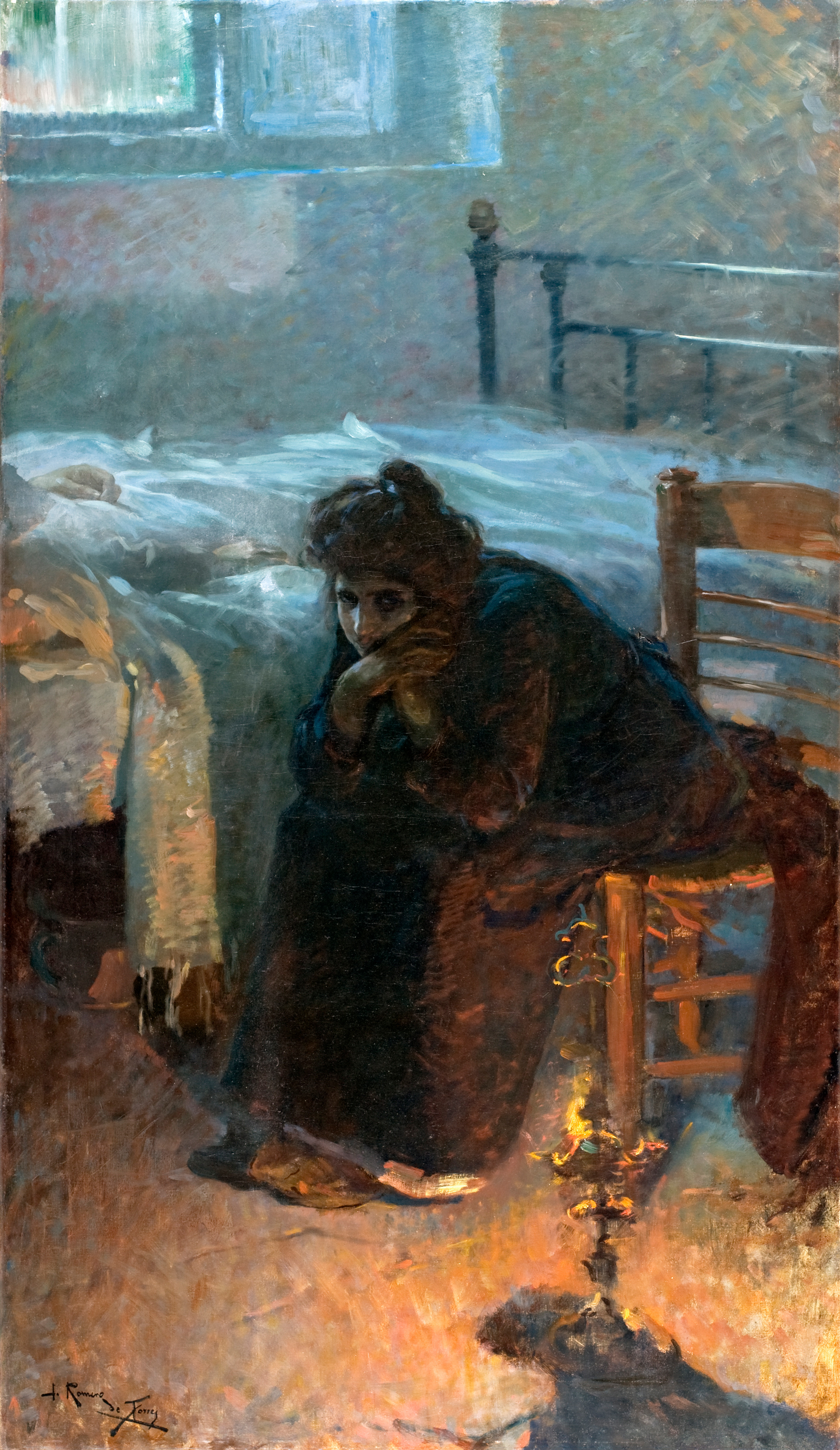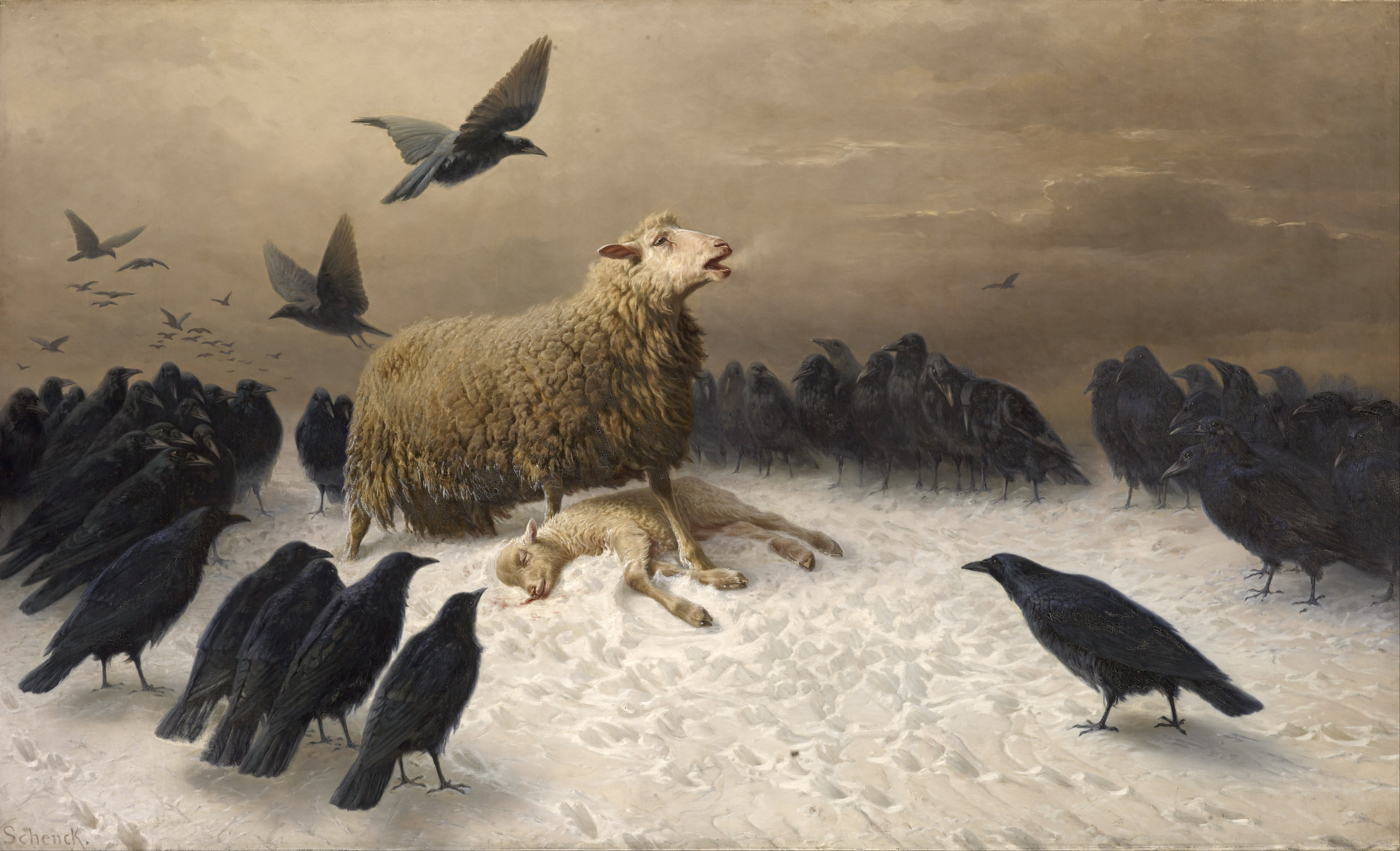Anguish on:
[Wikipedia]
[Google]
[Amazon]
 Anguish (from the
Anguish (from the
 Anguish is made up of fear, distress, anxiety and panic. These stressors cause an enormous amount of dissonance, which could then lead to issues of mental health. While taken literally anguish may be defined as a physical event, but it may be extrapolated to an event of one’s psyche. It has been found that the anguish of a significant change in the way a young student lives (i.e. their new responsibilities, being on their own, multiple deadlines etc.) has contributed to significantly increased rates of college students with anxiety and depression.
Anguish is made up of fear, distress, anxiety and panic. These stressors cause an enormous amount of dissonance, which could then lead to issues of mental health. While taken literally anguish may be defined as a physical event, but it may be extrapolated to an event of one’s psyche. It has been found that the anguish of a significant change in the way a young student lives (i.e. their new responsibilities, being on their own, multiple deadlines etc.) has contributed to significantly increased rates of college students with anxiety and depression.
 Anguish (from the
Anguish (from the Latin
Latin (, or , ) is a classical language belonging to the Italic branch of the Indo-European languages. Latin was originally a dialect spoken in the lower Tiber area (then known as Latium) around present-day Rome, but through the power of the ...
''angustia'' "distress") is "extreme unhappiness caused by physical or mental suffering." The feeling of anguish is typically preceded by a tragedy or event that has a profound meaning to the being in question. Anguish can be felt physically or mentally (often referred to as emotional distress).
Anguish is also a term used in philosophy
Philosophy (from , ) is the systematized study of general and fundamental questions, such as those about existence, reason, knowledge, values, mind, and language. Such questions are often posed as problems to be studied or resolved. Some ...
, often as a synonym for ''angst
Angst is fear or anxiety (''anguish'' is its Romance languages, Latinate cognate, equivalent, and the words ''anxious'' and ''anxiety'' are of similar origin). The dictionary definition for angst is a feeling of anxiety, apprehension, or insec ...
''. It is a paramount feature of existentialist
Existentialism ( ) is a form of philosophical inquiry that explores the problem of human existence and centers on human thinking, feeling, and acting. Existentialist thinkers frequently explore issues related to the meaning, purpose, and value ...
philosophy, in which anguish is often understood as the experience of an utterly free being in a world with zero absolutes (existential despair). In the theology of Søren Kierkegaard
Søren Aabye Kierkegaard ( , , ; 5 May 1813 – 11 November 1855) was a Danish theologian, philosopher, poet, social critic, and religious author who is widely considered to be the first existentialist philosopher. He wrote critical texts on ...
, it refers to a being with total free will
Free will is the capacity of agents to choose between different possible courses of action unimpeded.
Free will is closely linked to the concepts of moral responsibility, praise, culpability, sin, and other judgements which apply only to actio ...
who is in a constant state of spiritual fear in the face of their unlimited freedom.
Mental health
 Anguish is made up of fear, distress, anxiety and panic. These stressors cause an enormous amount of dissonance, which could then lead to issues of mental health. While taken literally anguish may be defined as a physical event, but it may be extrapolated to an event of one’s psyche. It has been found that the anguish of a significant change in the way a young student lives (i.e. their new responsibilities, being on their own, multiple deadlines etc.) has contributed to significantly increased rates of college students with anxiety and depression.
Anguish is made up of fear, distress, anxiety and panic. These stressors cause an enormous amount of dissonance, which could then lead to issues of mental health. While taken literally anguish may be defined as a physical event, but it may be extrapolated to an event of one’s psyche. It has been found that the anguish of a significant change in the way a young student lives (i.e. their new responsibilities, being on their own, multiple deadlines etc.) has contributed to significantly increased rates of college students with anxiety and depression.
Philosophy
*Kierkegaard views anguish as the same as suffering. Everyone wants to find the "truth" but it takes anguish and suffering to "appropriate" the truth. Kierkegaard put it this way in 1847 and 1850. *Friedrich Nietzsche
Friedrich Wilhelm Nietzsche (; or ; 15 October 1844 – 25 August 1900) was a German philosopher, prose poet, cultural critic, philologist, and composer whose work has exerted a profound influence on contemporary philosophy. He began his ...
saw a new form of anguish emerging from secularisation’s erosion of any moral absolute, producing thereby what he ironically called “The advantages of our times: nothing is true, everything is permitted”.
*Jean-Paul Sartre
Jean-Paul Charles Aymard Sartre (, ; ; 21 June 1905 – 15 April 1980) was one of the key figures in the philosophy of existentialism (and phenomenology), a French playwright, novelist, screenwriter, political activist, biographer, and litera ...
saw anguish as the product of man’s existential freedom, liable to manifest itself whenever a decision has to be made: thus when walking along a cliff, you might feel anguish to know that you have the freedom to throw yourself down to your imminent death. Sartre also saw the routines of everyday life as serving as “banisters” against existential despair: “guardrails against anguish”: alarm clocks...signposts, tax forms, policemen’.
Anguish and the trolley problem
A study done at the University of Princeton’s Center for the Study of Brain, Mind, and Behavior suggests that the presence of the emotion influences the decisions made. The study uses afunctional magnetic resonance imaging
Functional magnetic resonance imaging or functional MRI (fMRI) measures brain activity by detecting changes associated with blood flow. This technique relies on the fact that cerebral blood flow and neuronal activation are coupled. When an area o ...
machine to measure the brain waves of a subject when put into a difficult position. In this particular session, the subject was presented with a situation where she had to decide the fate of five people versus one person by the flip of a switch, and then decide the fate of five people versus one person by the physical acting of condemning a man to his death. The results of the fMRI stated that the decision of death by switch was easier than the decision of physically pushing a man to his death. It is theorized that the participant is being subjected to the emotion of anguish when faced with future possibility of physical condemning another person and therefore the brain enforces an “emotional block” to encourage the cessation of this behavior.
Music
Music has a particular way of eliciting emotions into its listeners. Hearing a song, symphony, or sonnet filled with anguish, one might begin to reflect upon their own life and experiences that coincide with the notes, thereby bringing repressed memories beyond subconscious to our salient mind.Elliott, D. J. (2005). Musical Understanding, Musical Works, and Emotional Expression: Implications for education. Educational Philosophy & Theory, 37(1), 93–103.See also
* Dark romanticism *Guernica
Guernica (, ), official name (reflecting the Basque language) Gernika (), is a town in the province of Biscay, in the Autonomous Community of the Basque Country, Spain. The town of Guernica is one part (along with neighbouring Lumo) of the mu ...
*Limit-experience Limit-experience (french: expérience limite) refers to actions which approach the limits of possible experience. This can be in terms of their intensity and seemingly impossible or paradoxical qualities. A limit-experience dissociates the subject ...
*Marsyas
In Greek mythology, the satyr Marsyas (; grc-gre, Μαρσύας) is a central figure in two stories involving music: in one, he picked up the double oboe (''aulos'') that had been abandoned by Athena and played it; in the other, he challenged ...
*The Scream
''The Scream'' is a composition created by Norwegian artist Edvard Munch in 1893. The agonized face in the painting has become one of the most iconic images of art, seen as symbolizing the anxiety of the human condition. Munch's work, including ...
References
External links
* * {{emotion-footer Existentialist concepts Emotions